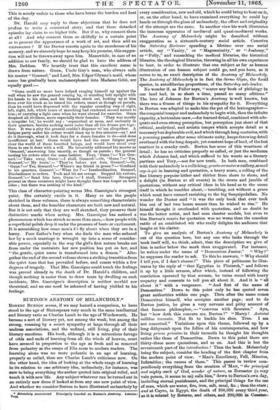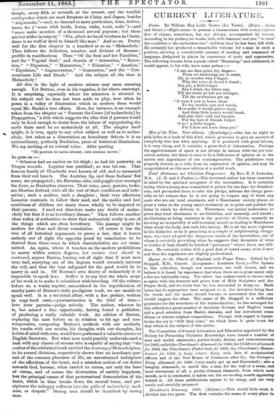BURTON'S ANATOMY OF MELANCHOLY.*
ROBERT BuirroN seems, if we may hazard a comparison, to have stood to the age of Shakespeare very much in the same intellectual and literary ratio as Charles Lamb to the age of Wordsworth. He became a sort of literary pet, not among the weak, but among the strong, roaming by a secret sympathy at large through all their undress associations, and the unfixed, still living, play of their literary emotions. His book, although it is a miraculous farrago of odds and ends of learning from all the winds of heaven, must have seemed in proportion to the age as fresh and as removed from pedantry as the essays of Elia seem to modern readers. The learning alone was no more pedantic in an age of learning, properly so called, than are Charles Lamb's criticisms now. On the other hand, the idea of looking at the whole range of learning in its relation to one arbitrary idea, melancholy, for instance, was sure to bring everything the author quoted into original relief, and touch it with new life. Any subject whatever van be turned out in an entirely new dress if looked at from any one new point of view. And whether we consider Burton to have illustrated melancholy by • Melancholy Anatomized. Principally founded on Burton's Anatomy. London: Tegg.
every consideration, new and old, which he could bring to bear on it, or, on the other hand, to have examined everything he could lay hands on through the glass of melancholy, the effect and originality of the attempt are the same. In another view his work illustrates the immense apparatus of mediaeval and quasi-mediteval works. The Anatomy of Melancholy might be described without exaggeration as a sixteenth-century social article. Conceive the Saturday Reviewer spending a lifetime over one social article, say " Vanity," or " Magnanimity," or " Jealousy," or "Folly," and ransacking the medical libraries, the historical libraries, the theological libraries, throwing in all his own experience to boot, in order to • illustrate that one subject as far as human illustration of one 'human subject could go, and you have, as it seems to us, an exact description of the Anatomy of Melancholy. The Anatomy of Melancholy is in fact the Sermo Gigas, the fowll species, in antediluvian proportions, of the Saturday sub-leader.
No wonder if, as Fuller says, " scarce any book of philology in our land had, in so short a time, passed so many editions." The love of Johnson for Burton's Anatomy is well known, but there was a fitness of things in his sympathy for it. Everything in Burton was adapted to make him the pet of the lexicographer— the congenial temper and melancholy to begin with, then the infinite capacity, a bottomless maw,—for learned detail, combined with ade- quate and even strong perception, but perception just short of that critical, analytical, and artistic temper which accepts detail as a necessary but deplorable evil, and which through long centuries, with a yearning passion after some ultimate unity, keeps throwing detail overboard with the long despair, yet constant hope of land, of the lost mariner in a cranky craft. Burton has none of this weariness of detail ; he has no criticism properly so called, or just the modicum which Johnson had, and which sufficed to his wants as a literary partizan and Tory,—not for new truth. In both men, combined with their melancholy is a rollicking, gravis=armat urx raillery, armed cap-h-pie in learning and quotation, a heavy scorn, a rolling of the fine literary porpoise hither and thither from shore to shore, and a delight (in Burton at all events) in the storm and jumble of quotations, without any critical ideas in his head as to the ocean itself in which he tumbles about,—tumbling, not without a grace which must have seemed ravishing to the big Sesquipedalian. No' wonder the Doctor said " it was the only book that ever took him out of bed two hours sooner than he wished to rise." He himself thought it overloaded with quotation, and no doubt he was the better artist, and had seen chaster models, but even to him Burton's mania for quotation was no worse than the ceaseless rattle of an established wit who really delights the audience that laughs at his clatter.
To give an analysis of Burton's Anatomy of Melancholy is out of the question here, but any one who looks through the book itself will, we think, admit, that the description we give of him is rather below the mark than exaggerated. For instance, he writes under the name of " Democritus Junior." " Why ?" he supposes the reader to ask. To this he answers, " Why should I tell you, if I don't choose?" This piece of politeness he illus- trates by the reply of " that Egyptian in Plutarch," and follows it up by a little sermon, after which, instead of following the conviction operated by that sermon, he turns round with heavy coquetry and consents to tell you all about it. And it is " all about it" with a vengeance. "And first of the name of Democritus." Down to this point only he has quoted seven great authorities within one page. Then after the name comes Democritus himself, who occupies another page ; and to do Burton justice, he gives a very nervous and pithy account of that famous philosopher, — " coxvou.s with Socrates." Aye, but "how doth this concern me, Burton ?" "Marry! Antistat millibus trecentis. Not fit to buckle his shoe. True. I am not conceited." Variations upon this theme, followed up by a long dithyramb upon the follies of his contemporaries, and how living privus privatus in their turmoils he thought his thoughts rather like those of Democritus. Down to this point there are thirty-three more quotations, and so on. And this is but the seventeenth part of the introduction ! Then the book. Melancholy being the subject, consider the heading of the first chapter from the modern point of view. "Man's Excellency, Fall, Miseries, Infirmities ; the causes of them." This passes in review com- pendiously everything from the creation of 'MArr, " the principal and mighty work of God, wonder of nature, as Zoroaster (a very vain person, it seems to us) calls him," down to Barton's own day, including eternal punishment, and the principal things for the use of man, which are water, fire, iron, salt, meal, &c. ; then the stars ; and at Capri), in Egypt, the death of 300,000 every third_ year, as it is related by Boterus, and others, and 200,000 in Constan- tinople, every fifth or seventh at the utmost, and the terrible earthquakes which are most frequent in China and Japan, besides " shipwracks,"—and, to descend to more particulars, lions, wolves, bears, &c. (" some with hoofs, horns, tusks, teeth, nails ")—and 'some make mention of a thousand several poysons ; but these are but trifles in respect." "For, albeit we be all brethren in Christ, there is no wolf or devil to himself like man." And so on. Pretty well for the first chapter in a hundred or so on " Melancholy.' Then follows the definition, number, and division of diseases ; prolific in ramifications. Then " Of the Soul and her Faculties," and the " Vegetal Soul," and therein of " Attraction," " Reten- tion," " Digestion," " Maturation," " Elixation," " Assation," " Expulsion," "Augmentation," " Generation," and the " Con- comitants Life and Death." And the subject all the time is Melancholy !
All this in the light of modern science may seem amusing enough. Yet Burton, even in his vagaries, is far above contempt. It is surprising, especially where his attention is rivetted to his subject and he does not turn aside to play, how often he pours in a volley of illustration which in modern dress would equal Mr. Buckle's best efforts. Here, for instance, is an example taken from the chapter on " Parents the Cause [of melancholy] by Propagation," a title which suggests the idea that if parents would only be kind enough to desist from the labour of repopulating the earth there need be no melancholy at all. The chapter itself might, it is true, apply to any other subject as well as to melan- choly. but taken as a dissertation on hereditary defects it is an extraordinary, perfectly Buckleian, piece of historical illustration. We say nothing of its critical value. After quoting "Et patrum in notes abeunt, cum semine, mores," he goes on :--
" Seleueus had an anchor on his thigh ; so had his posterity, as Trogus records. Lepidus was purblind ; so was his son. That famous family of CEnobarbi were known of old, and so surnamed from their red beards. The Austrian lip, and those Indians' fiat noses, are propagated ; the Bavarian chin, and goggle eyes amongst the Jews, as Buxtorfius observes. Their voice, pace, gesture, looks, are likewise derived, with all the rest of their conditions and infir- mities ; such a mother, such a daughter ; their very affections Lemnius contends to follow their seed, and the malice and bad conditions of children are many times wholly to be imputed to their parents. I need not therefore make any doubt of melan- choly but that it is an hereditary disease." Then follows another close volley of authorities to show that melancholy really is one of the things which are often hereditary. The passage might be modern for close and direct cumulation. Of course it has the vice of all historical arguments to prove a law, that it leaves entirely out of sight the opposite proof by cumulation to be derived from those cases in which characteristics are not trans- mitted. As, again, where it touches on the modern prohibitions to marry within certain degrees, lest certain vices should be continued, argues Burton, leaving out of sight that if most men were bad, marrying out of the degrees would certainly increase the evil, and that the best safeguard for the good would be to marry in and in. Of Barton's own theory of melancholy it is impossible to speak here. Suffice it to say that the whole scope of his work is to make it coincident with brooding. Of the volume before us, a washy reprint, emasculated in the republication of sundry parts of Burton's truly prodigious work, we are unable to speak well. It is a wretched affair, with a fine preface, written in copy-book cant,—procrastination is the thief of time— love your parents—judge nobody. The author, whoever he is, has missed a fine opportunity, having found a publisher, of producing a really valuable work. An edition of Burton, replacing the man before us in relation to his age and con- temporaries, comparing Burton's methods with our methods, his results with our results, his thoughts with our thoughts, his habits of mind with ours, would have performed a valuable service to English literature. But what man could possibly undertake such a task with any chance of success who is capable of saying that "the author of thecelebmted work entitled theAncitcmiyof3felancholy has, in its several divisions, respectively shown that an inordinate pur- suit of the common pleasures of life, an unrestrained indulgence of the affections of the heart, and a mistaken notion of our duties towards God, become, when carried to excess, not only the bane of .virtue, and of course the destruction of earthly happiness, but the principal causes of that preternatural fermentation of the brain, which in time breaks down the mental beam, and pre- cipitates the unhappy sufferers into the gulfs of melancholy, mad- ness, or despair." Strong men should be described by strong men.































 Previous page
Previous page